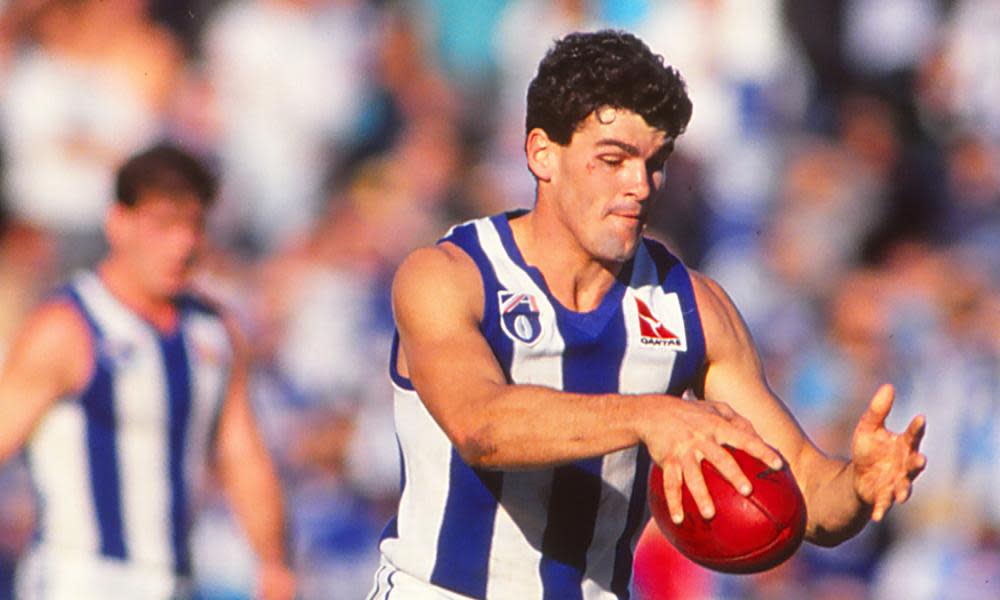Concussion payout to former AFL player Shaun Smith reinforces CTE link with contact sport

The former AFL player, Shaun Smith, has been awarded a $1.4m insurance payout in a landmark decision for concussion in sport. MLC Life Insurance on Friday recognised Smith had suffered “total and permanent disablement” due to the head knocks he sustained during his 11-year career.
Industry insiders say the decision makes another important connection between playing contact sport and chronic traumatic encephalopathy, which could potentially lead to a future class action. However similar payouts may not be available to other players due to the nature of their insurance.
The 51-year-old former Melbourne and North Melbourne player, who took out a personal policy 25 years ago, has suffered mental health issues he believes are related to concussions he sustained while playing the game at the highest level during the late 1980s and 1990s.
Related: Danny Frawley's CTE diagnosis can drive research, say concussion experts
“I have a bit of a list [of issues],” Smith told 3AW. “It does affect you day-to-day. Some days you wake up and you are just not right. You wake up in a fog while other days you wake up and feel fine.
“It makes concussion real. The footy codes need to realise that if you get knocked out you can’t play next week or the week after. I think about boxing where if you get knocked out I think you have to have six to eight weeks off. So why is AFL any different?”
Professor Jack Anderson from the Melbourne Law School at the University of Melbourne said causation was the key issue in making the link between contact sport, particularly the AFL, and concussion.
“In other words, by playing football in the 1980s and 1990s, did that cause measurable brain damage later on in life for the players? This insurance payout is a recognition that there is causation,” he said.
AFL player agent Peter Jess – who supported Smith through the case – said the fact that other players may not be entitled to payouts like this due to insurance through the AFL’s major insurer AMP is unacceptable.
“It’s a denial of every player’s basic human rights,” Jess told AAP. “They are employees and they should be able to turn up to their workplace and know full well that they are covered in a sufficient manner for any of these outcomes that we’re talking about, and they’re simply not.”
Smith’s payout is the first of its kind in Australia, but his situation is not unique – former greats Graham “Polly” Farmer and Danny Frawley were both with diagnosed CTE after their deaths in the last year. Professor Anderson said these cases tell a story about past concussion protocols in the sport.
“There’s potentially a class action going to occur in the near future, mainly for players from the 1980s and 1990s, with the issue of what concussion protocols were like then,” he said.
“When you look at all that, you wonder whether or not, in the same way as the American sports did… whether a settlement or a redress type scheme…based on independent medical assessment of players would be the way to go.”
The issue is one that will likely continue to arise, even if all players do not have access to the same type of insurance coverage as Smith. Concussion has been an ongoing problem across AFL and the rugby codes, due to their high contact nature – but also in other sports such as cricket and netball.
Professor Anderson said there was also a question of the financial repercussions. “What impact will this decision today have on future insurance premiums for all contact sports?” he said. “Will we see the insurance costs rise as a result of this?”
An AFL spokesperson said the health and safety of all players was paramount.
“In recent years we have strengthened match day protocols, changed the laws of the game to further discourage high contact, improved the identification of potential concussive incidents through industry leading video technology, and we continue to invest in research to better understand concussion at all levels of the game,” the spokesperson said.
“Earlier this year the AFL made changes to the concussion guidelines for the 2020 AFL and AFLW seasons to reflect our ongoing conservative approach in managing concussions at the elite level. These guidelines will continue to be reviewed based on expert medical advice and research.”

 Yahoo News
Yahoo News 
